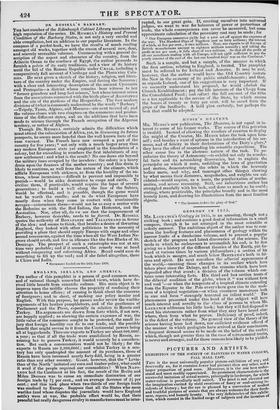DR RUSSELL'S BARBARY.
THE last number of the Edinburgh Cabinet Library maintains the high reputation of the series. Dr. Russian's History and Present Condition of the Barbary States, is not only a very careful and able compilation, but an addition to our popular literature. In the compass of a pocket-book, we have the results of much reading amongst old works, together with the cream of several new, dear, and scarcely accessible volumes. Commencing with a general de- scription of the aspect and character of the country, from the Atlantic Ocean to the confines of Egypt, the author proceeds to furnish a précis of its early traditions, and a view of its history until the fall of the Roman Republic under CESAR, including a comparatively full account of Carthage and the Phce&cian Cob. flies. He next gives a sketch of the history, religion, and litera- ture of the country under the Empire, and during the Saracens; with a clear and interesting description of the ancient Cyrenaica and Pentapolis—a district whose remains bear witness to her "former grandeur and long.lost science," but whose interest arises from the associations connected with the birth-place of ARISTI peus and the site of the gardens of the Hesperides. The four modern divisions of (what is commonly understood by the word) "Barbary" —Tripoly, Tunis, Algiers, and Morocco—are next treated of; and the volume closes with two chapters on the commerce and produc- tions of the different states, and on the additions that have been made to science through the French occupation of the Algerine territory, or rather of Algiers.
Though Dr. Russian certainly admits the difficulties which must attend the colonization of Africa, yet, in discussing its future prospects, he seems more hopeful than the well-known facts of the case warrant. The French have now occupied a part of the country for five years ; * not only with a much larger army than any modern European state yet employed in the foundation of a colony, but far exceeding in numbers the first inhabitants of any new settlement : and what is the result? No one dares stir beyond the military lines occupied by the invaders: the colony is a heavy drain upon the finances of the mother country ; and this drain is likely to continue, as well from the nature of the climate,which afflicts Europeans with sickness, as from the hostility of the na- tives, whose incursions—difficult to prevent and impossible to punish—would be alike destructive to crops and cattle. To civilize them, if practicable, would require the lapse of several generations ; to build a wall along the line of the Sahara. would be effectual, and is possible, though the game would not be worth the candle; and to do what Europeans have mostly done when they came in contact with irreclaimable savages—exterminate them—would not be so easy a matter with the Bedouins as with the Red Indian, the Hottentot, and the Australian. Nor, after all, do we see that the improvement of Barbary, however desirable, needs to be forced. Dr. RUSSELL quotes the authority of BONAPARTE and TALLEYRAND in favour of the idea ; and seems to think, that besides a desire of thwarting England, they looked with other politicians to the necessity of providing a place that should supply Europe with sugar and other second necessaries, against the time when all the West Indian Ne- groes should revolt, and live in idleness like the free Blacks of St. Domingo. The prospect of such a catastrophe was not at any time very probable; and if it occurred, the remedy was at hand without conquering and colonizing Africa. Brazil could soon do something to fill up the void; and if she failed altogether, there is China and India.
• Bouestorrr landed on the 14th June 1830.






















 Previous page
Previous page